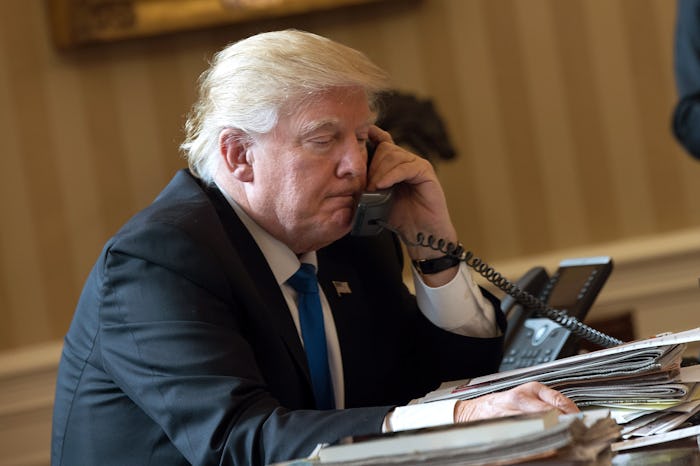News

Why Trump Won't Be Impeached Over Alleged Intel Sharing
According to White House officials, President Trump allegedly shared highly classified information with both Russian Foreign Minister Sergei Lavrov and Ambassador Sergey Kislyak during their visit last week. According to The Washington Post, which first reported the story, the alleged disclosure could jeopardize a standing relationship between the United States and a foreign ally, given an intelligence sharing agreement currently in place. It might also threaten the involvement of key sources close to the Islamic State. Basically, it's a pretty big deal. But is it actually illegal? And could Trump be impeached for allegedly disclosing classified information? It's a tricky situation.
Impeachment isn't exactly an easy process and the short answer is that Trump probably won't be impeached for anything anytime soon. To be impeached, a president has to be found guilty of "treason, bribery, or other high crimes and misdemeanors" in both the House of Representatives and the Senate. Given both the House and Senate are controlled by Trump's own party right now, something huge would have to flip a number of legislators to vote against him.
Disclosing information that sensitive to Russia, which is not part of the intelligence-sharing partnership, sounds pretty bad — but the president also has a special authority to declassify information. Because technically, disclosing information is something he's allowed to do, even if the CIA and NSA aren't happy about it.
Romper's requests for comment from the NSA and the CIA were not immediately returned, though National Security Adviser H.R. McMaster said in a televised statement to the press on Monday,
There's nothing the president takes more seriously than the security of the American people. The story that came out tonight, as reported, is false. The president and the foreign minister reviewed a range of common threats to our two countries, including threats to civil aviation. At no time were intelligence sources or methods discussed. And the president did not disclose any military operations that were not already publicly known. Two other senior officials who were present, including the secretary of state, remember the meeting the same way, and have said so. Their on the record account should outweigh those anonymous sources. And I was in the room. It didn't happen.
Some Democrats are already claiming that this alleged disclosure could be used to show that Trump has a pattern of cooperating and negotiating with Russia in ways that may not be in the country's interest. For example, the Democratic National Committee issued a statement Monday, claiming,
Russia no longer has to spy on us to get information – they just ask President Trump and he spills the beans with highly classified information that jeopardizes our national security and hurts our relationships with allies. If Trump weren’t president, his dangerous disclosure to Russia could end with him in handcuffs.
BuzzFeed News reported that officials in the know claimed the situation was actually "much worse" that the original Washington Post story let on, so it's likely that Americans will hear some ambitious legislators calling for Trump's ties to Russia to be investigated further in the coming days.
Despite Trump's denial of any wrongdoing, the Senate Intelligence Committee is currently investigating his campaign for its dealings with Russia nonetheless. One of the men with whom allegedly shared the highly classified information was Ambassador Sergey Kislyak, who is also at the center of those investigations for allegedly talking sanctions with Gen. Michael Flynn and other unnamed members of Trump's team. In addition to the investigation, Trump's firing of former FBI director James Comey in the middle of the Russia investigation was also criticized as questionable.
But pattern or not, it would take some legal and mathematical magic to impeach Trump for this. Disclosing that intelligence could possibly be construed by a creative legal mind as "treason," if Russia somehow used the intelligence against the United States later, or "high crimes and misdemeanors" for putting American intelligence agents in danger, but there would have to be a very direct tie between Trump's disclosure and what Russia did with the information. At the moment, given that the White House has vigorously denied the alleged disclosure at all, it's looking unlikely.
For now, because of the office he holds, it was most likely legal for Trump to share classified information with Russia. It's still very far from being the last straw for the Trump presidency.